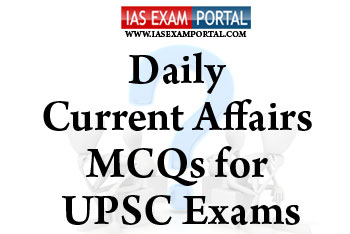Current Affairs MCQ for UPSC Exams - 16 DECEMBER 2018
Current Affairs MCQ for UPSC Exams - 16 DECEMBER 2018
Q1. Which of the following constitutes the principles of the proposed draft National Education Policy (NEP) :
1) Universalization of Elementary Education.
2) Establishment of Model Schools or Centres of Excellence.
3) Social Relevance and Radical Transformation of the Curricula.
4) Vocationalisation of Primary Education.
5) Linking degrees with jobs.
a) 1 & 2 only
b) 2 & 3 only
c) 1 & 3 only
d) all of the above
Q2. Consider the following statements with respect to the distribution pattern of medicinal plants in India :
1) About 70% of India's Medicinal Plants are found in tropical forests of
Western and Eastern ghats, the Vindhyas, Chotta Nagpur plateau, Aravalis and the
Himalayas.
2) Large percentage of medicinal plants occur in evergreen and temperate regions
than in dry & moist vegetation areas.
3) Habit-wise classification has shown that about 33% of medicinal plants are
trees, 32% herbs, 20% shrubs, 12 % creepers and 3% others.
Which of the above statements are true ?
a) 1 & 2 only
b) 2 & 3 only
c) 1 & 3only
d) all of the above
Q3. Consider the following statements with respect to Graphene :
1) Graphene consists of a single layer of carbon atoms arranged in a
hexagonal lattice, each atom bound to its neighbours by chemical bonds.
2) The elasticity of these chemical bonds produces resonant vibrations known as
neons which are measured using Raman’s spectroscopy.
3) a potential new application of this material has been discovered, that is for
detecting Amyotrophic Lateral Sclerosis (ALS) — a progressive brain disorder for
which there is currently “no objective diagnostic test.”
Which of the above statements are true ?
a) 1 & 2 only
b) 2 & 3 only
c) 1 & 3only
d) all of the above
Q4. Which of the following statements with respect to the special relationships between India-Nepal are true ?
1) Nepal and India have an open border, with free movement of people. Nepal’s
currency is pegged to the Indian currency.
2) Nepali and Indian workers can work freely in each other’s countries, without
visas and work permits. Nepal and India gain tremendously from remittances from
the other.
3) Nepal has declared circulation of high denomination Indian notes as illegal
within the country.
a) 1 & 2 only
b) 2 & 3 only
c) 1 & 3only
d) all of the above
Q5. Which of the following Indian National Movement leaders are known as the “Bismarck of India “ :
a) Jawaharlal Nehru
b) SardarVallabhbhaipatel
c) Bhagatsingh
d) Subhash Chandra Bose


